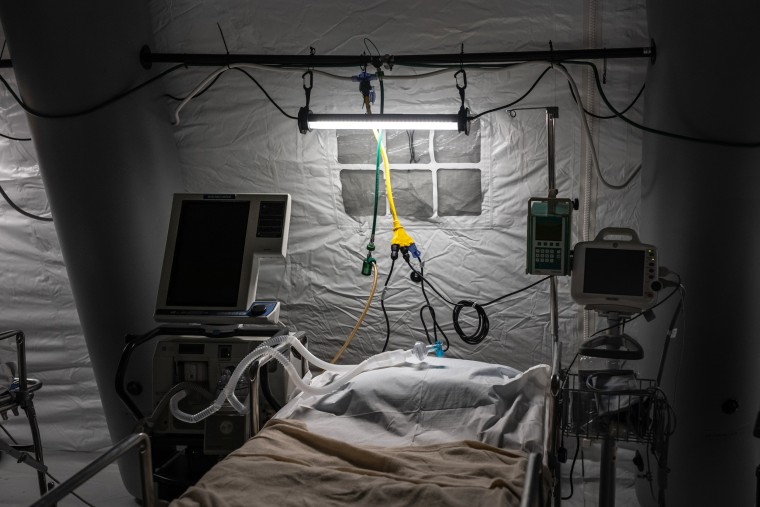Kemah Zinnah, an intensive care nurse at Suburban Hospital in Bethesda, Maryland, waited “with bated breath” hoping that no more Covid-19 patients would arrive after two died more than a week ago.
“Maybe we’re seeing the end to this influx of patients, and so far, fingers crossed, we are lucky," Zinnah said. "We haven’t seen any yet."
Zinnah is one of many health care professionals who celebrated on Twitter a return to more normal hospital business after more than a year of being overwhelmed with Covid-19 cases.
With nearly 150 million Americans fully vaccinated, some hospitals are now reporting zero Covid-19 patients for the first time since the beginning of the pandemic, marking a milestone in the fight against Covid-19 and lifting a weight off the shoulders of health care professionals who have dealt with the virus on the front lines.
The number of new Covid-19 cases and hospitalizations are down dramatically since the height of the pandemic earlier this year. The current seven-day average of new Covid-19 hospitalizations is 1,879, down from a peak of more than 16,000 in January. The United States is currently reporting a seven-day average of about 12,000 new Covid-19 cases per day, down from a peak of about 250,000 a day in January.
The University of North Carolina Health system similarly saw zero patients in its Covid-19 unit for a 36-hour period, and as of last Thursday, June 17, the unit had just two Covid-19 patients in its care, said Subhashini Sellers, an assistant professor of medicine at UNC who also practices at UNC Health.
Sellers said she feels cautiously optimistic as the number of Covid-19 patients dwindles — she is still anxious about potential surges of new patients, but said she is relieved to be beyond the pandemic’s worst stages.
For Sellers and other health care workers, the lack of Covid-19 patients is a step toward easing the mental trauma that responding to the pandemic created.
“You had to call their families every day, multiple times a day, if things weren’t going well especially. That took a toll,” Sellers said. “At the height of things, I was struggling to just not be completely worn down by all of the horror and sadness that we saw every day.”
Sellers estimated that her hospital would see 40 to 60 Covid-19 patients at once at the height of the pandemic — a dramatic difference from the hospital’s current numbers. Seeing that many Covid-19 patients at once made her go numb, Sellers said, a feeling she is ready to shed now that things are returning to a sense of pre-pandemic normalcy.
“I feel like I can allow myself to feel more, and to connect with patients, and to really find joy in my everyday life because there is just the room to do that,” Sellers said. “It’s a relief.”
The declining number of Covid-19 hospital patients can be credited to the success of vaccinations, according to health care workers, who urged Americans to get vaccinated.
Jeremy Faust, a doctor at Brigham and Women’s Hospital in Boston, said that as vaccine eligibility expanded to more age groups, he began to see fewer Covid-19 patients on his shifts.
“Most of the serious critical care that we were providing a year ago or last spring was Covid related, and now almost none of it is,” Faust said.
Faust said it's been weeks since he's seen a Covid-19 patient during one of his shifts, but continues to urge younger adults in particular to get vaccinated.
“It’s a tragedy for anyone to die unnecessarily when they had access,” Faust said. “I want people to realize that from here on out, for most people, it can be preventable.”
The upcoming flu season this fall makes it crucial for people to get the Covid-19 vaccine, Zinnah said, to prevent two potentially devastating diseases from becoming widespread at once.
“For us nurses, we just are thankful for the vaccine, and we want to encourage people who are able to take it to definitely take it,” she said.
